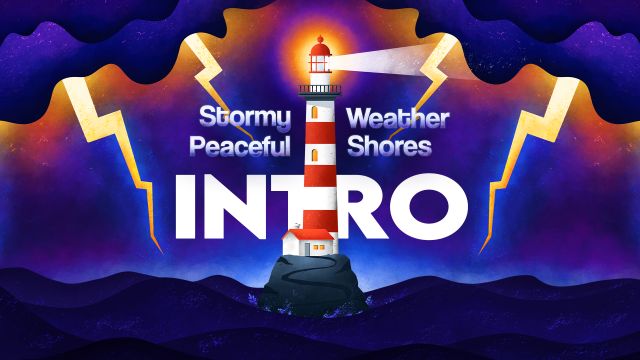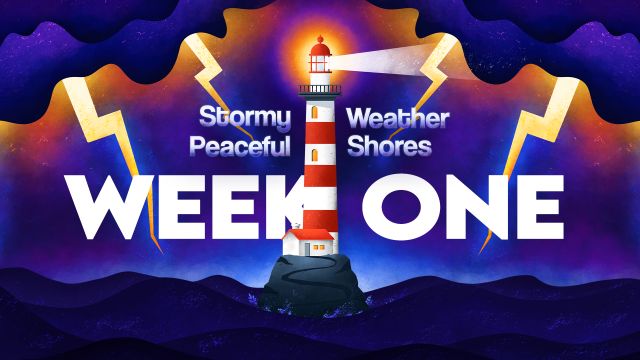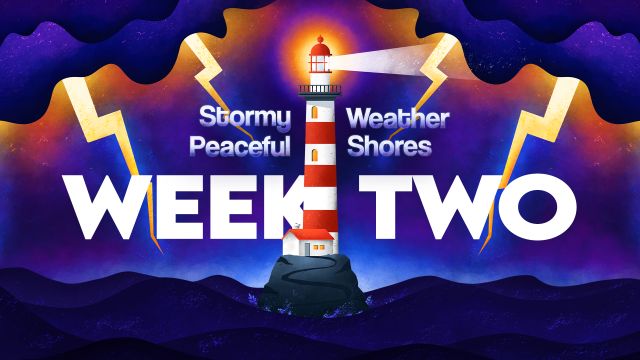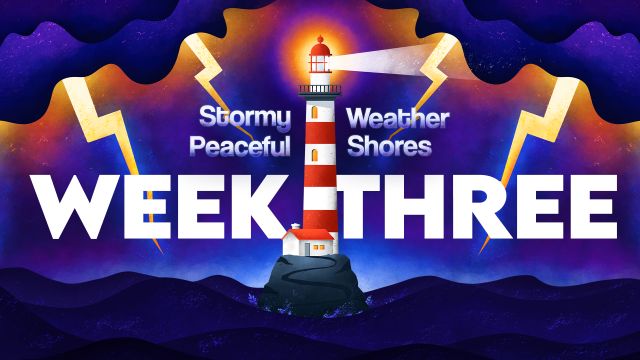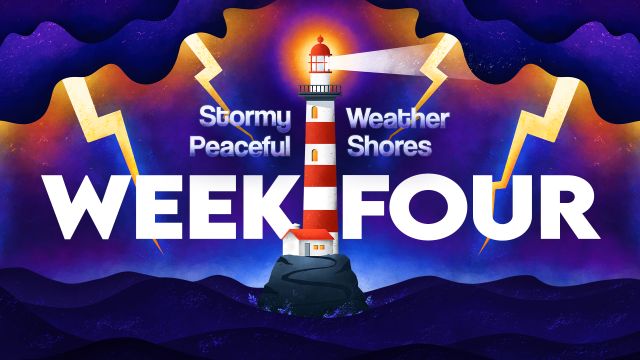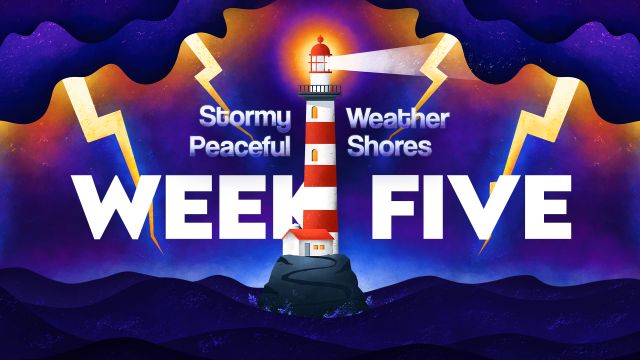Stormy Weather, Peaceful Shores - Connect Groups
What Are Connect Groups?
What are Connect Groups?
‘Connect Groups’ is the name we give to small informal gatherings who decide to meet together to explore the Bible alongside our monthly themes. These groups are independent and folk can simply set up their own Connect Group themselves, meeting together with friends and family on their own basis. In this time of Lockdowns when people can’t get together physically this material can still be used to meet together online.
Each month we produce a range of questions to adapt our themes for group discussion. The material is offered as a starting point and there is no need to go through all the questions.You can pick and choose, tailoring it to suit the needs and interests of your group. Each ‘Part’ could form the basis of a weekly roughly 90 minute meeting but you could break it up differently. Let us know if you would like to find out more about Connect Groups and different ways of linking into the Sanctuary First community.
We all come to the Bible with our own questions, insights and barriers. The guiding principle we have in writing these is to ask questions we don’t already know the answer to! Our hope is to facilitate open-ended discussions. Often the most valuable parts of group chats are the bits that go off on bizarre tangents. And there’s nothing wrong with that. Jesus knows a thing or two about bizarre tangents…
Need some advice on starting your own Connect Group?
Get in touch.
Introduction
Introduction
 Join us this October as we contemplate the weather: a powerful force — and a powerful metaphor — that shapes all aspects of our lives. We will be reflecting on both literal and figurative storms, and how right there in the midst of it all, Jesus is there beside us: windswept, rain-lashed, and holding on to us, as we hold on to him…
Join us this October as we contemplate the weather: a powerful force — and a powerful metaphor — that shapes all aspects of our lives. We will be reflecting on both literal and figurative storms, and how right there in the midst of it all, Jesus is there beside us: windswept, rain-lashed, and holding on to us, as we hold on to him…
This trilogy of themes began in August with looking around at Habitats of Hope, continued in September with looking back at 80 Generations and concludes with us looking up to the skies! Humans have looked upwards for countless generations, trying to discern patterns and find meaning while seeking shelter and sustenance.
The weather can be both a source of exhilarating joy and terrifying despair. The means of our nourishment and a devastator of our livelihoods. Whether it be through traveling, foraging, cultivating, building, or scientific and technological endeavour we have always had to tune in to the weather — equally reliant upon and wary of it. And so it isn’t surprising that the weather gives us a vivid and compelling way of describing our emotional landscape, with all its upheaval, transformation, delights and disappointments.
In storm and wind, rain and sun we have a vocabulary for putting into words the unnerving, exciting and sometimes frightening business of being alive.
But one thing that we can hold on to through all the storms of life is Jesus… because he’s holding on to us too. There is no sea too rough and no sky too dark for Jesus to come to our side. Jesus doesn’t promise his disciples there won’t be storms, but he does say there will be peace, the storm is not all there is.
Storms do end.
There is reason to take hope.
Peace is not only possible, it’s ultimately what is being realised through his Kingdom of love and compassion.
As the seasons change join us as we explore both the metaphor and reality of stormy weather as it affects our lives. Over the weeks we will be thinking about wind, rain, clouds, peace, calm and ultimately: the Communion of Saints that urges us on through the storms.
SEEDS TO SOW: We have a 'Seeds to Sow' phrase at the beginning of each section. These are open-ended and optional and are designed for people wanting to develop their own ideas/resources in response to the material. Perhaps if using this material as a group you could use these prompts to inspire a time of prayer, or drawing, or creative writing? They are intended to be short and sweet, simply a starting off place for you and your imagination, be encouraged to tailor/develop as suits your group.
Download the Discussion Questions as a PDF
These discussion questions adapt our monthly themes for small Connect Groups or personal Bible study. The questions are divided into 5 parts to correspond with the 5 weeks of the Daily Worship theme. They are offered as a guideline and there is no need to go through all the given questions in a single session, or in the following sequence. Feel free to pick and choose, or adapt to what interests you or your group.
Find how to get involved: Connect group Blog
Week One
Creation cries out
 How long must the land mourn? As we begin our new theme we are tuning in to the howl of the wind, the rage of the storm, the sighing in the lull — and how we use the imagery of intense weather to talk about intense emotions. We will also consider how extreme weather events can be read as the mourning of an ecosystem in trouble, that is perhaps out of alignment. Creation cries through the storms, literal and figurative, that roll through our world. Creation cries as the equilibrium is disturbed. Creation cries through you and me, looking up at the latest storm to come through… But who is listening?
How long must the land mourn? As we begin our new theme we are tuning in to the howl of the wind, the rage of the storm, the sighing in the lull — and how we use the imagery of intense weather to talk about intense emotions. We will also consider how extreme weather events can be read as the mourning of an ecosystem in trouble, that is perhaps out of alignment. Creation cries through the storms, literal and figurative, that roll through our world. Creation cries as the equilibrium is disturbed. Creation cries through you and me, looking up at the latest storm to come through… But who is listening?
SEEDS TO SOW: WHAT EMOTIONS DO YOU ASSOCIATE WITH STORMS?
Read Psalm 13
The storm of longing.
The cry to connect — to be known and acknowledged in the midst of the tumult — runs deep in the fabric of creation, up to and including ourselves as represented by the psalmist here.
How do you feel about the sudden change of tone between verses 4 and 5? What do you make of it?
Read Psalm 57
Taking shelter.
God is with us no matter what. We don’t have to have the right mindset, attitude, game plan, credentials, learning, or boxes ticked. We just have to cry out.
What do you think the psalmist means when they say (or sing) “Awake, my soul!” (verse 8)?
Read Jeremiah 12: 1- 4
How long must the land mourn?
We turn to the cry of nature as pressure mounts and resources are exploited.
Can you think of contemporary examples of the land mourning or suffering?
* SEEDS TO SOW: These are open-ended and optional prompts and are designed for people wanting to develop their own resources in response to the themes. Perhaps if you are using this material as a group you could use these prompts to inspire a time of prayer, or drawing, or creative writing? They are a short and sweet, simply a starting off place for you and your imagination. Tailor and develop as suits your group.
Week Two
Looks like rain
 Rain is a rich metaphor and essential component of vibrant diverse life. But rain — vital for agriculture and potentially ruinous to buildings and infrastructure — is a multi varied thing in human experience. Rain is a bittersweet sensation — it can be bleak and oppressive or romantic and thrilling. In rain — in its overabundance or scarcity — there is danger as well as life, longing as well as fulfilment, devastation as well as renewal. But even the hardest rain cannot sweep away God’s love. Rain sustains us and challenges us, refreshes and restores us — in the journey of water as it rises and falls we see a parable about life: powerful, relentless, awe inspiring, and ultimately renewing.
Rain is a rich metaphor and essential component of vibrant diverse life. But rain — vital for agriculture and potentially ruinous to buildings and infrastructure — is a multi varied thing in human experience. Rain is a bittersweet sensation — it can be bleak and oppressive or romantic and thrilling. In rain — in its overabundance or scarcity — there is danger as well as life, longing as well as fulfilment, devastation as well as renewal. But even the hardest rain cannot sweep away God’s love. Rain sustains us and challenges us, refreshes and restores us — in the journey of water as it rises and falls we see a parable about life: powerful, relentless, awe inspiring, and ultimately renewing.
SEEDS TO SOW: WHAT HAS RAIN MEANT TO YOU IN YOUR LIFE? DO YOU LIKE IT? HATE IT?
Read Matthew 20: 1-16
Raining on the parade.
The rains have been good. There’s plenty of fruit to harvest, and the landowner is happy to hire the ‘unhireables’ to help. But the end puts a dampener on things for the early birds who assume they’re going to get a bonus for clocking on early. How would you feel as one of those early workers?
Read Isaiah 55: 6-11
A refreshing system.
Taking inspiration from the water cycle to glean insights into God’s love that saturates our world.
Let’s further explore the cyclical analogy in verses 10 and 11. If the Lord’s word is like rain that doesn’t "return empty” what does it mean for God’s word to return to God? Is it poetically hinting at some kind of infinitely renewable system of grace? How would that work?
Read Isaiah 5: 1-7
Cultivating insights.
Rain and sunlight allow us to turn some earth and a handful of seeds in to food. But sometimes, even with the best intentions, things don’t take root.
Is there something to learn here in this passage about letting go of old places? While the vineyard itself is abandoned that doesn’t mean the vine stock itself is forsaken — it can be grafted and planted anew — but the old has to be let go of first.
Are we sometimes more bothered with shoring up old walls than in relocating the vine? And how do we decide when is time to uproot and graft the vine stock somewhere new?
* SEEDS TO SOW: These are open-ended and optional prompts and are designed for people wanting to develop their own resources in response to the themes. Perhaps if you are using this material as a group you could use these prompts to inspire a time of prayer, or drawing, or creative writing? They are a short and sweet, simply a starting off place for you and your imagination. Tailor and develop as suits your group.
Week Three
Sunlight through the clouds
 God does not promise us a life without storms, but we are promised that we are not alone. This week we reflect on the shafts of light that break into our everyday lives, the light that illuminates the sky and warms our souls. In literal and figurative storms we are never forgotten, abandoned, written off.
God does not promise us a life without storms, but we are promised that we are not alone. This week we reflect on the shafts of light that break into our everyday lives, the light that illuminates the sky and warms our souls. In literal and figurative storms we are never forgotten, abandoned, written off.
Always there is a light left on.
SEEDS TO SOW: WEATHER IS A POPULAR METAPHOR IN SONGWRITING, WHAT SONGS ABOUT THE WEATHER CAN YOU THINK OF, DO YOU HAVE ANY FAVOURITES?
Read Psalm 139: 7-12
Deeply known.
We may sometimes feel lost in the storms of life, but we are never forgotten or truly alone, we are remembered, we are known, we are found by God.
What interests, strikes, puzzles or stands out to you about this reading? What questions do you have about God’s relationship with us?
Read Matthew 5: 43-48
It’s not just your sunshine.
The sunlight that breaks through the clouds is the same sun that warms us all. God doesn’t have favourites. The majesty of God’s love is not that we make the best, most elite team, it’s that he wants to recruit all of us!
God is not wonderful because we are singled out, God’s wonderful because we aren’t… because none of us have to prove we are worthy of sunshine.
How can we ourselves be sunshine for the people we meet today — especially if they are people we find difficult or frustrating?
Read Isaiah 9: 2-7
Hope dawns.
Let’s reflect on these timeless words and then work together to use them to inspire a prayer to warm the souls of all those walking a difficult road in darkness.
* SEEDS TO SOW: These are open-ended and optional prompts and are designed for people wanting to develop their own resources in response to the themes. Perhaps if you are using this material as a group you could use these prompts to inspire a time of prayer, or drawing, or creative writing? They are a short and sweet, simply a starting off place for you and your imagination. Tailor and develop as suits your group.
Week Four
In the eye of the storm
 In the penultimate week of our theme we come to the eye of the storm, the centre of the whirlwind… the uncanny places in the midst of the tumult where the pressure drops and we come face to face with the almighty.
In the penultimate week of our theme we come to the eye of the storm, the centre of the whirlwind… the uncanny places in the midst of the tumult where the pressure drops and we come face to face with the almighty.
SEEDS TO SOW: IF YOU WERE TO PAINT A PICTURE OF JESUS CALMING THE STORM, HOW WOULD YOU DO IT? HOW WOULD YOU DEPICT JESUS’S ACTION? DESCRIBE THE PICTURE.
Read Jonah 2
Fish Belly Prayer.
While we may not be in the belly of a fish ourselves, most of us probably pray ‘Fish Belly Prayers’ at some point — prayers of longing from deep waters.
Nonetheless this is undoubtedly a strange pungent prayer about a strange pungent predicament. As you read it what words stand out to you? What challenges, comforts or intrigues you?
Read Luke 8: 22-25
Jesus isn’t Thor or Odysseus.
In other stories, about other heroes, the storm would be used as a tool, perhaps as a weapon, or a point of leverage to get one over on an adversary. But Jesus doesn’t co-opt or manipulate the storm, harnessing it for his own ends. He simply finds a way to calm it.
What do you make of Jesus’s ability here? And if he is able to affect the weather like this why doesn’t he use it at other times in the gospel to, say, escape persecution or fight injustice?
Read Luke 15: 11-20
Pig Sty Prayer.
Let’s reflect on this story together as a whole (perhaps sharing our favourite moment, or a part that is standing out to us for another reason) before focusing on verses 16-19 and the younger’s son flash of insight and resolution to return home.
Then (like with Isaiah 9: 2-7 last week) work together to craft a prayer in response to this passage: A 'Pig Sty Prayer’ about how God finds us and speaks to us right the midst of where we are.
* SEEDS TO SOW: These are open-ended and optional prompts and are designed for people wanting to develop their own resources in response to the themes. Perhaps if you are using this material as a group you could use these prompts to inspire a time of prayer, or drawing, or creative writing? They are a short and sweet, simply a starting off place for you and your imagination. Tailor and develop as suits your group.
Week Five
Peaceful Shores
 Having travelled through this stormy theme the last four weeks we come at last to the peaceful shore, the second part of our title. All Saints Days falls in this final part of the theme. It is a day when we remember all the saints: all the saints that have been, all the saints there are, and all the saints that are to come! We are a heavenly collective. We are all connected and we all matter. None of us are insignificant. We belong to God, and through God we belong to one another.
Having travelled through this stormy theme the last four weeks we come at last to the peaceful shore, the second part of our title. All Saints Days falls in this final part of the theme. It is a day when we remember all the saints: all the saints that have been, all the saints there are, and all the saints that are to come! We are a heavenly collective. We are all connected and we all matter. None of us are insignificant. We belong to God, and through God we belong to one another.
We all have a part to play. We saints on a mission from God. To live lives committed to those who need us and connected to the realities of heaven — of goodness and kindness and hope. Lighthouses guiding the storm-wrecked to peace. Through Communion we are connected to a cloud of saints urging us on. The storm is not all there is. There is peace too, hard won.
SEEDS TO SOW: WHAT DOES IT MEANT TO BE A SAINT?
Read Isaiah 25: 1-9
(once before and once after the question, and as many more times as you like!)
A peaceful shore. Wiping away tears.
As you read this text what one word stands out to you?
Read Hebrews 12: 1-2
All Saints.
Through all weathers, there is a cloud of saints urging us on!
What inspires you from the history of our faith to work for peace today? Both in the global sense and the personal history of you and your local community.
Read Revelation 5: 8
Smelling the sweet scent of the prayers of the saints.
Here we are given a vivid multi-sensory picture, inviting us to consider molecular prayers rising through the air. This connects us back to Isaiah 55: 6-11 that we looked at in week 2 with its image of The Lord’s word falling and returning like rain.
What would happen if we pictured our prayers actually as literal molecules rising to heaven to mingle with other molecules to form great clouds? How could that image inspire our prayers this week?
* SEEDS TO SOW: These are open-ended and optional prompts and are designed for people wanting to develop their own resources in response to the themes. Perhaps if you are using this material as a group you could use these prompts to inspire a time of prayer, or drawing, or creative writing? They are a short and sweet, simply a starting off place for you and your imagination. Tailor and develop as suits your group.





